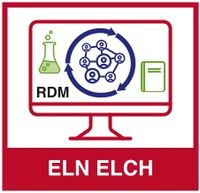ELN ELCH ELN for electrochemical reactions |
Motivation: Digitization is a key step for efficient, sustainable and reproducible research and an essential prerequisite for preserving, sharing and reusing information without loss. In order to enable digitization and in particular the digitization of process documentation and data processing in the respective research areas, software adapted to the needs of the disciplines is required. For chemical work, software for digitization must meet special requirements, as the software must be suitable for mapping samples and their inheritance, for example, and must be able to interpret chemical drawings. This results in a wide range of dependencies - including on special cheminformatics toolkits, which require a complex design of software for chemistry. Typically, electronic laboratory notebooks (ELNs) are used to digitize processes in the field of experimental work, which are often supplemented by laboratory information and management systems (LIMS) in industrial environments. However, only very few of these laboratory notebooks can efficiently cover chemical work. Most of the currently available laboratory journals are not available as open source for open further development and do not reflect the currently important standards for FAIR (findable, accessible, interoperable, reusable) data.
Objectives and procedure: In this innovation-accompanying measure, the ELN (Electronic Laboratory Notebook) Chemotion is to be adapted to the requirements of electrochemistry so that the ETOS cluster is equipped with the necessary digital tools to generate reproducible and reproducible results in an efficient manner and to accelerate research processes. The existing ELN Chemotion, which is optimized for the needs of organic chemistry, is to be equipped with the necessary functions so that research within the ETOS cluster can be optimized in terms of speed, precision and completeness of documentation. The establishment of the ELN enables the standardization of process documentation, the standardization of information and the provision of intelligent tools in combination with the possibility for many partners to access common data. This will facilitate the work within ETOS and accelerate the acquisition of knowledge and transfer of results to industry.
Innovations and perspectives: The extension of the ELN towards software tailored to electrochemistry for documentation, analysis and information provision is the essential prerequisite for providing a research data infrastructure that supports the working groups in ETOS in carrying out the chemical work and its interpretation. The work enables the generation of FAIR data, which can be reused by the international chemical community through an optional transfer to repositories. The project promotes the fulfillment of the requirements defined by the DFG for the documentation of research processes and the preservation of the resulting research data. By involving the applicants in the work of the NFDI, the work can be coordinated nationally and internationally and a sustainable contribution can be made to the further development of infrastructure for the entire community.
Coordinators:
Stefan Bräse (KIT) stefan.braese@kit.edu
Nicole Jung (KIT) nicole.jung@kit.edu
Further project participants:
Siegfried R. Waldvogel (MPI CEC) siegfried.waldvogel@cec.mpg.de
Philipp Röse (KIT) philipp.roese@kit.edu


